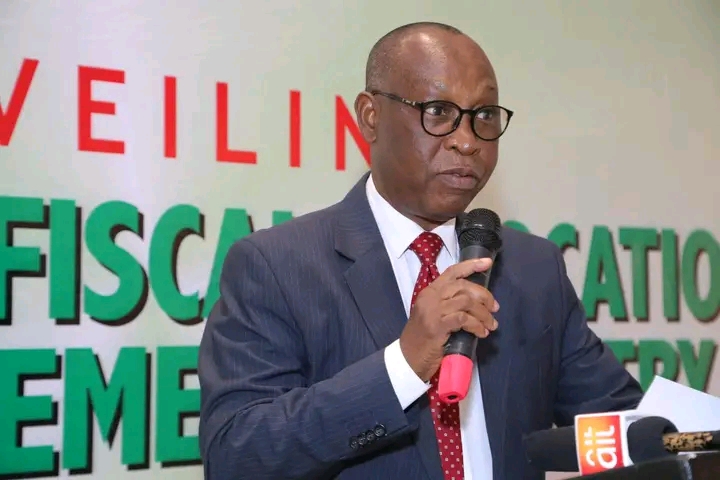- ₦5.42 trillion disbursed to the Federal, State and Local Governments
- Mineral Revenue contributed N6.40 trillion
- Non-mineral revenue contributed N4.80 trillion
The Nigeria Extractive Industries Transparency Initiative (NEITI) says the Federal government revenue generating agencies remitted a total of about ₦14.38 trillion as revenue from the extractive sector to the Federation Account (FA) between January 1, 2020 and December 31, 2021.
The revenue generating agencies include the Nigerian National Petroleum Company Limited (NNPCL), the Nigerian Upstream Regulatory Commission (NUPRC), the Federal Inland Revenue Service (FIRS), the Ministry of Mines and Steel Development (MMSD), and the Nigeria Customs Service (NCS).
A breakdown of the remittances showed that mineral revenue accounted for ₦6.40 trillion (about 44.5% of total remittances) for the period, while other non-mineral revenue (excluding VAT) contributed ₦4.80 trillion (about 33.37% of total remittances).
These information and data are contained in the latest Fiscal Allocation and Statutory Disbursement (FASD) report published by the Nigeria Extractive Industries Transparency Initiative (NEITI) which covered the period 2020-2021.
Executive Secretary of NEITI, Dr. Orji Ogbonnaya Orji while presenting the highlights of the report stated that the information and data contained in the NEITI latest FASD reports reviewed processes that characterized all transactions within the sector.
It looked at independent assessments of financial transactions in the areas of revenue receipts and payments and how the processes weighed on the scale of transparency and accountability in the oil and gas sector during the period under review.
Other areas that NEITI focused on, in this report, were projects executed, deployment to capital projects and recurrent expenditure and how these aligned with the core responsibilities of the agencies, the government and citizens expectations.
NEITI’s FASD Report examined total extractive industries revenue remitted to the Federation Account, tracked allocation and disbursement from the account to statutory recipients as well as utilization and application of the funds by beneficiaries between the years 2020 to 2021.
The audit covered four (4) federal revenue generating and eleven (11) beneficiary agencies that are involved in the management of extractive industries funds. It also covered nine selected states: Akwa-Ibom; Bayelsa; Delta; Gombe; Imo; Kano; Nasarawa; Ondo and Rivers states.
The beneficiary agencies include: Tertiary Education Trust Fund (TETFund); Petroleum Technology Development Fund (PTDF); Niger Delta Development Commission (NDDC); Nigerian Content Development and Monitoring Board (NCDMB); Nigeria Midstream and Downstream Petroleum Resources Agency (NMDPRA) – PEF Nigeria Midstream and Downstream Petroleum Resources Agency (NMDPRA) – PPPRA. Others are: Nigeria Sovereign Investment Authority (NSIA); Development of Natural Resources Fund (DNRF); Stabilisation Fund; Ecological Fund; Excess Crude Account (ECA)
The report, which is the fourth in the audit cycle, revealed that overall remittances to the Federation Account for the period increased by about 14%.
The Auditor General of the Federation Mr. Shaakaa Chira represented by the Director of Audits Mr. Sundung Eldad James stated that the FASD report is useful to the office of the Auditor General and it is also in fulfillment of the Agency’s mandate as enshrined in the Constitution of Nigeria.
He stated that the report will further assist his office when performing the Audit of the federation revenue, its collection, remittance, and disbursement process. Also it will aid periodic checks of deductions and transfers made before remittances and the FAAC Allocations” Mr. Eldad affirmed.
In his goodwill, Nigerian Midstream and Downstream Petroleum Regulations Authority (NMDPRA) Chief Executive Officer Mr Faruk Ahmed represented by the Director Operations Mr. Oseni Mukaila Adewale stated that the role being played by NEITI over the years include transparency in public and private sector businesses and even beyond the extractive industries. NEITI’s demand for accountability from stakeholders has increased sense of responsibility among agencies and government institutions towards enhancing revenue and maximum value for Nigerian people.
“Today marks an epoch making event, being that the vital information, data and crucial facts to be unveiled will provide opportunity for hind-sight so that we can have a better foresight on our national revenue profile, disbursement and utilization with implications for consolidation, improvement or possible review”. Mr. Oseni explained.
The Executive Director, African Centre for Leadership, Strategy and Development (Centre LSD) and the global representative of the Publish What You Pay (PWYP) Mr. Monday Osasah who gave a goodwill message on behalf of the civil society organisations stated that NEITI has simplified the work of the civil society. He charged the CSOs to use the information provided by NEITI as a tool for advocacy.
The report was compiled by an Independent Administrator, Messrs Amedu Onekpe & Co., on behalf of the National Stakeholder Working Group (NSWG), otherwise called NEITI Board, in accordance with the NEITI Act, 2007 and the EITI Standard.
Other findings of the report are highlighted as follows;
Out of a total Mineral Revenue of N6.40 trillion, the report said the DPR now NUPRC accounted for the highest contribution of about N2.71 trillion, or 18.83% of the total remittances, followed by FIRS with N2.13trillion, or 14.81%, and NNPC with N1.55 trillion, or 10.8%, while the least contribution was from the Solid Mineral with N13.33 billion, or 0.09%.
The report revealed that the contribution by the NNPC declined significantly by 56%, along with the FIRS, whose contribution also dropped by 10%. The decrease in the revenue remittances by both the NNPC and FIRS was attributed to the decrease in revenue generated from crude oil exports in 2021.
Similarly, non-mineral revenue of about N4.80 trillion (or 33.37% of total remittances, increased by N3.86 billion from 2020 to 2021, with the highest contribution of N2.69 trillion, or 18.71% coming from the Company Income Tax (CIT), followed with N2.025 trillion, or 14.08% from the Nigeria Customs Service (NCS) and N85.25 billion, or 0.59% from other tax sources.
While the revenue from CIT in 2021 declined by 5.25% from 2020, the report said the revenue realized by the NCS in 2021 increased by 40.55%, while other taxes significantly recovered from a deficit in 2020 to a positive balance in 2021.
However, the report said the remittances from royalty and other fee payments from the DPR and MMSD (solid minerals) increased significantly by 84% and 43% respectively for the corresponding years.
Receipts from VAT, which increased significantly for the two years period, resulted in the remittance of about ₦3.18 trillion (or 22.1% of total remittances to the Federation Account, while the revenue generated by the NCS increased by 41% during the period under review.
Federal Government States and Local Government shared ₦5.42 trillion Mineral Revenue.
The publication of FASD report is in fulfillment of Nigeria’s obligation to the global Extractive Industries Transparency Initiative (EITI) and in compliance with the provisions of the NEITI Act 2007.
NEITI encouraged Nigerians especially the civil society and the media to use the information contained in the report for advocacy and accountability purposes to ensure prudent use and management of Nigeria’s extractive revenues and bring about sustainable development.







